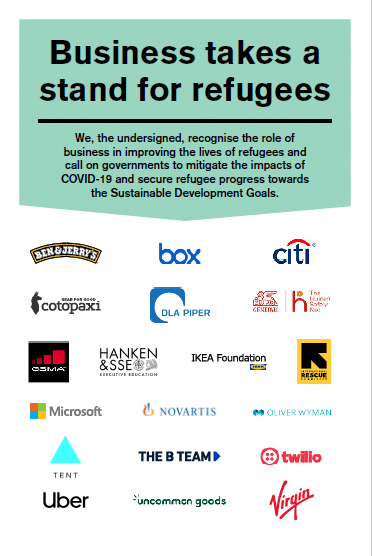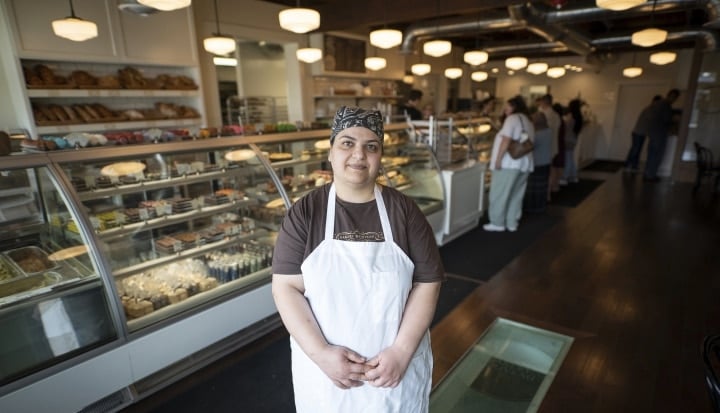On 16 September, the Business Refugee Action Network (BRAN) released its Business Takes a Stand for Refugees Sustainable Development Goal (SDG) Statement, endorsed by 19 businesses and organisations, including Virgin Group, Ben & Jerry’s and Citi and supported by Deputy Chair of The Elders and former UN Secretary-General Ban Ki-moon.
Ahead of the UN General Assembly’s high-level segment, business used its voice to call on governments to include refugees in the SDGs, support them in the wake of COVID-19 and call out the racism and xenophobia they face. We know that refugees are likely to be among those hardest hit by the health and economic crisis created by COVID-19, and that the support of business is crucial to ensuring they’re not left behind.
Impact of COVID-19 on refugees’ economic inclusion
Analysis of COVID-19’s effect on refugee livelihoods demonstrates grave outcomes for this group. Early estimates estimated the equivalent of 195 million jobs lost worldwide – with women in the informal sector impacted the most. Recent research has shown that refugees are more likely to work in sectors financially impacted by the pandemic, and refugee-hosting countries are projected to experience slower growth in 2020 compared with other developing nations and world averages. [1] Specific findings include:
- Within refugee-hosting countries, refugees are 60 percent more likely to work in sectors of the economy impacted most by COVID-19, relative to 37 percent of host populations.
- Only 7 percent of refugees work in the least impacted sectors, like education and public administration, compared to 19 percent of hosts.
- Refugee women are at a particular disadvantage; in the Latin America and sub-Saharan Africa regions where refugee women are most likely to work, they are over-represented in highly impacted sectors.
Building back better
Refugees and displaced people were already frequently overlooked in governments’ plans to meet the SDGs. As the international community shapes its medium and long-term response to COVID-19, it is essential that we prioritise reforms that support the most vulnerable and result in more inclusive economies. For refugees, increased labour market access and expanded, inclusive social protection are crucial. We would be happy to work with your company or organsation to support the economic inclusion of refugees – if you would like to participate in the Business Refugee Action Network (BRAN) or endorse BRAN’s 2020 statement, please do get in touch at Bu***************@re*******.org .
For further information:
- Please see our press release here for further information on BRAN’s 2020 Statement release.
- The Business Refugee Action Network (BRAN) was established in 2018 with the aim of improving the lives of refugees globally through the influence and action of business. Its founding members are Virgin Group, The B Team, Ben & Jerry’s, IRC and the Tent Partnership for Refugees.
[1] In this analysis, authors calculated and compiled estimates from eight large refugee-hosting countries with available representative data: Colombia, Ethiopia, Iraq, Jordan, Lebanon, Peru, Turkey, and Uganda. The data analysed are largely from 2015-2018, where researchers could extract comparable statistics across countries. This paper represents the largest quantitative cross-country comparison of refugees: 10.64 million, or 37 percent of all refugees worldwide.
Editor’s Note:
This article is part of Business Fights Poverty NYC Online 2020, a one-week, online conference (21 to 25 September) that builds on our recent online conference Business Fights Poverty Online 2020 (13 to 17 July) to drive forward connection, conversations and collaboration around how we rebuild better – how together we create an equitable and resilient world. The week consists of inspiring and engaging content, live events, peer networking and community-led learning. The week also builds on our Business and COVID-19 Response with Harvard Kennedy School Corporate Responsibility Initiative, and supported by DFID and a number of our corporate partners.
Each day, we will focus on a specific theme: Imagining the Future We Want (Monday); Creating an Equitable World (Tuesday); Helping People Survive and Thrive (Wednesday); Building Resilient Livelihoods (Thursday); Shaping System-Level Partnerships (Friday).
You can register here to join us at the online event.










